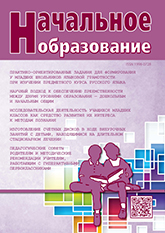Moskva, Moscow, Russian Federation
CSCSTI 14.15
CSCSTI 14.25
The article substantiates the possibility of forming universal educational actions that characterize the information literacy of a primary schoolchild. The following actions are considered: data search in a mathematical task, presentation of information in a given or independently selected form, interpretation of information obtained during the solution in the form of an answer, conclusion or explanation. The pedagogical conditions for the successful development of a primary school student’s ability to work with information using the means of the subject “Mathematics” are described: highlighting common skills and actions for mathematical and informational literacy, using group work to motivate children to learn, maximize inclusion in it, etc.
primary school student; mathematics; work with information; training action; group form of training organization
1. Blonskij P.P. Trudovaya shkola [Labor school]. Moscow: Literaturno-izdatel'skij otdel Narkomata po prosveshcheniyu Publ., 1919. 114 p.
2. Blonskij P.P. Trudovaya shkola [Labor school]. Vladivostok: Dal'nevostochniy kraevoi soyuz zemstv i gorodov Publ., 1921. 299 p.
3. Vinogradova N.F. Koncepciya nachal'nogo obrazovaniya: «Nachal'naya shkola XXI veka» [The concept of primary education: "Elementary school of the XXI century"]. Moscow: Ventana-Graf Publ., 2017. 64 p. EDN: https://elibrary.ru/YSADBM
4. Vinogradova N.F., Kalinova G.S. Samostoyatel'naya rabota uchashchihsya na urokah okruzhayushchego mira [Students' independent work in the lessons of the world]. Nachal'noe obrazovanie [Primary education]. 2019, I. 3, pp. 43-47. DOI: https://doi.org/10.12737/article_5d0c83269e3763.12476985; EDN: https://elibrary.ru/CRTKBL
5. Kovalyova G.S., Krasnyanskaya K.A., Rydze O.A. Rezul'taty vypolneniya diagnosticheskih rabot po matematike, russkomu yazyku i chitatel'skoj gramotnosti v pyatyh klassah [The results of diagnostic work in mathematics, the Russian language and reading literacy in the fifth grades. - M .: Publishing house of the Institute for Education Development Strategy of the Russian Academy of Education]. Moscow: Institut strategii razvitiya obrazovaniya RAO Publ., 2018, pp. 4-30.
6. Kotel'nikov A.V. Senchenkov N.P. P.P. Blonskij o detskom liderstve [Blonsky on child leadership]. Pedagogika [Pedagogy]. 2019, I. 7, pp. 103-109.
7. Mezhdunarodnoe issledovanie po ocenke kachestva matematicheskogo i estestvenno-nauchnogo obrazovaniya TIMSS [International study on the assessment of the quality of mathematical and science education TIMSS]. Available at: http://www.centeroko.ru/timss15/timss15_pub.htm (accessed 18 November 2019).
8. Rydze O.A., Krasnyanskaya K.A. Matematika. 4 klass. Podgotovka k VPR. Raznourovnevye proverochnye raboty [Maths. 4th grade. Preparing for VLOOKUP. Multilevel verification work]. Moscow: Ventana-Graf Publ., 2018. 96 p.
9. Federal'nyj gosudarstvennyj obrazovatel'nyj standart nachal'nogo obshchego obrazovaniya utv. Prikazom Ministerstva obrazovaniya i nauki RF ot 06.10.2009 № 373 [Federal state educational standard of elementary general education / approved. By order of the Ministry of Education and Science of the Russian Federation dated 06.10.2009 No. 373]. Sajt informacionno-pravovogo obespecheniya «Garant» [Website of the information and legal support “Garant”]. Available at: http://ivo.garant.ru/#/document/197127/paragraph/2644:0 (accessed 17 November 2019).
10. Lompscher J. Motivation and activity // European Journal of Psychology of Education. - 1999. - I. 1. - Pp. 11-21.
11. Mullis I.V.S., Martin M.O., Ruddock G.J. (Eds.). TIMSS. G4_Booklet 1,5. Chestnut Hill, MA: TIMSS & PIRLS International Study Center, Boston College. - 2014. - 36 r.
12. Mullis I.V.S., Martin M.O., Foy P. & Hooper M. TIMSS-2015: International Results in Mathematics. Chestnut Hill, MA: TIMSS & PIRLS International Study Center, Boston College. - 2016. - 288 r.
13. Sahlberg P. Finish Lessons: What Can the World Learn from Educational Change in Finland? - New York: Teacher College Press,2015. - 230 p.






